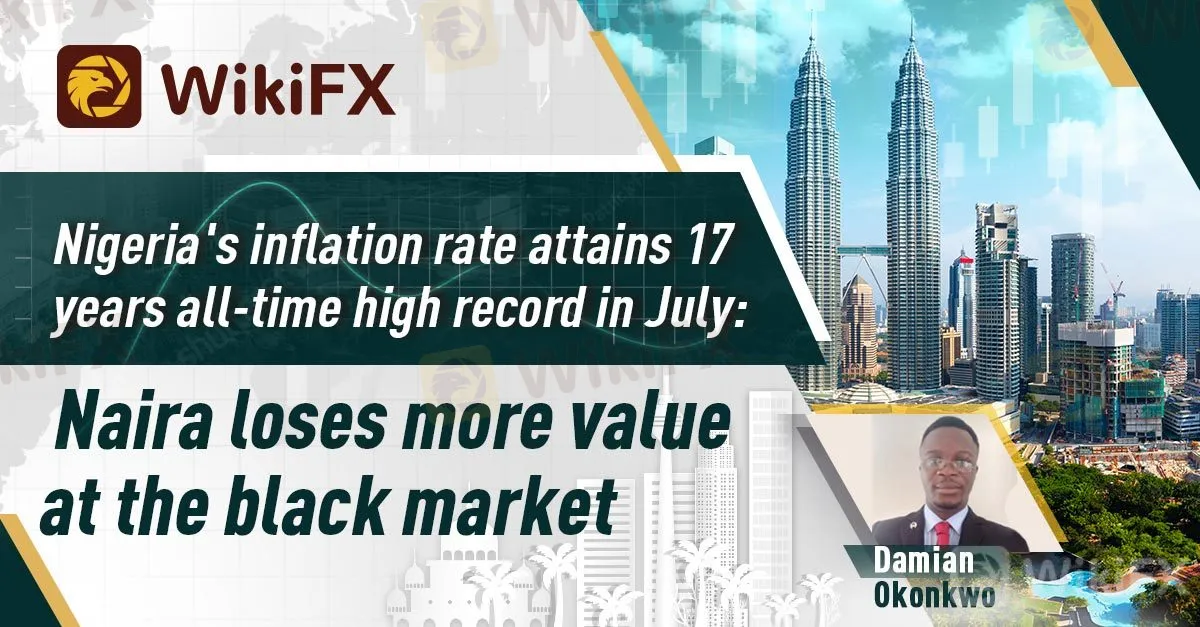简体中文
繁體中文
English
Pусский
日本語
ภาษาไทย
Tiếng Việt
Bahasa Indonesia
Español
हिन्दी
Filippiiniläinen
Français
Deutsch
Português
Türkçe
한국어
العربية
Nigeria's inflation rate attains 17 years all-time high record in July
Abstract:The Nigerian inflation rate attained a new high record at 19.64% YoY in July 2022, against the 17.38% recorded in July 2021, marking its highest level in 17 years. This was as a result of the naira devaluation and the rising cost of production within the country. According to the Chief executive officer, National Bureau of Statistics - Prince Semiu Adeniran, the highest inflation rate was recorded in the prices of gas, liquid fuel, solid fuel, transportation, garments, cleaning, repair, and hire of clothing.

By: Damian Okonkwo

Nigeria's inflation rate attained an all-time-high in July 2022, with the inflation rate rising to 19.64% YoY marking its highest level since 2005.
According to the data released last week by the Chief executive officer, National Bureau of Statistics - Prince Semiu Adeniran, the consumer price index which measures the rate of inflation rose to 19.64% in July. This marks an over 2.27% increase compared to the 17.38% recorded in June 2021.
Speaking on the major areas where the highest inflation was recorded within the country, Adeniran remarked that the highest inflation rate came from all areas of individual consumption. Here he revealed that the high food cost of food caused by the disruption in the food supply was the major cause of the inflation witnessed in July 2022.
The disruption in food supply he explained, could be attributed to the high cost of transportation due to high fuel cost.
Still more, Adeniran stated that the increase in the inflation rate could be further traced to the high cost of importation by traders as a result of the devaluation of the Naira.
Speaking on the reason for the high cost of goods produced in the country, he believed this could be attributed to the high cost of production by companies due to the high cost of raw materials for their productions; as a result of the high exchange rate for Naira at the Investors and exchange (I&E) window.
The Naira exchange rate at the black market rose to N680/$ last Friday just a few points away from its previous high record above N700/$ recorded in July.
The exchange rate at the Importers and Export (I&E) window last Friday was N421.4 against the N419.2 recorded the previous week.
Above all, Adeniran mentioned that the average percentage change for the CPI YoY was 16.75%.
On a Month over Month (MoM) basis, Adeniran revealed that the food index in July 2022, decreased by 2.04% compared to the 2.05% recorded in June.
The Core CPI which excludes food and energy costs rose to 16.26% YoY in July. This marked a 2.54% increase compared to the 13.72% recorded in July 2021.
Given the high rate of inflation currently bedeviling the country, the cost of living in Nigeria has increased drastically in 2022 with the prices of goods and services almost doubling compared to their prices in 2020.
Notwithstanding the high cost of fuel today, the minister of State for Petroleum resources Dr. Timipre Sylva, revealed recently that the Federal government is losing 400,000 barrels of oil per day to crude oil theft. This means the country is not yet able go generate enough revenue from oil at the moment, and therefore likely that the rising enough cost will continue until the oil theft is controlled.

Disclaimer:
The views in this article only represent the author's personal views, and do not constitute investment advice on this platform. This platform does not guarantee the accuracy, completeness and timeliness of the information in the article, and will not be liable for any loss caused by the use of or reliance on the information in the article.
Read more

Top Profitable Forex Trading Strategies for New Traders
Know profitable Forex strategies for beginners, including risk management tips, best currency pairs, technical analysis tools, and timeframe selection.

WikiFX Review: Is IVY Markets Reliable?
IVY Markets, established in 2018, positions itself as a global brokerage offering a diverse range of trading instruments, including Forex, Commodities, Cryptocurrencies, and Stocks. The platform provides two primary account types—Standard and PRO—with a minimum deposit requirement of $50 and leverage up to 1:400.

Germany's Election: Immigration, Economy & Political Tensions Take Centre Stage
Germany is set to hold a crucial general election on 23 February 2025, with voter frustration over migration emerging as a dominant issue.

ED Exposed US Warned Crypto Scam ”Bit Connect”
The Indian Enforcement Directorate (ED) recently exposed a crypto Scam from a firm called Bitconnect. During the investigation, which took place on February 11th and 15th, 2025. The authority recovered bitcoin worth approximately Rs 1,646 crore & Rs 13.50 Lakh in cash, a Lexus car, and digital devices. This investigation was conducted under the provisions of the Prevention of Money Laundering Act (PMLA) of 2002.
WikiFX Broker
Latest News
Why Do You Keep Blowing Accounts or Making Losses?
eToro Adds ADX Stocks to Platform for Global Investors
B2BROKER Launches PrimeXM XCore Support for Brokers
Germany's Election: Immigration, Economy & Political Tensions Take Centre Stage
WikiFX Review: Is IVY Markets Reliable?
Checkout FCA Warning List of 21 FEB 2025
Google Bitcoin Integration: A Game-Changer or Risky Move?
IG 2025 Most Comprehensive Review
Why Should Women Join FX Market?
ED Exposed US Warned Crypto Scam ”Bit Connect”
Currency Calculator






